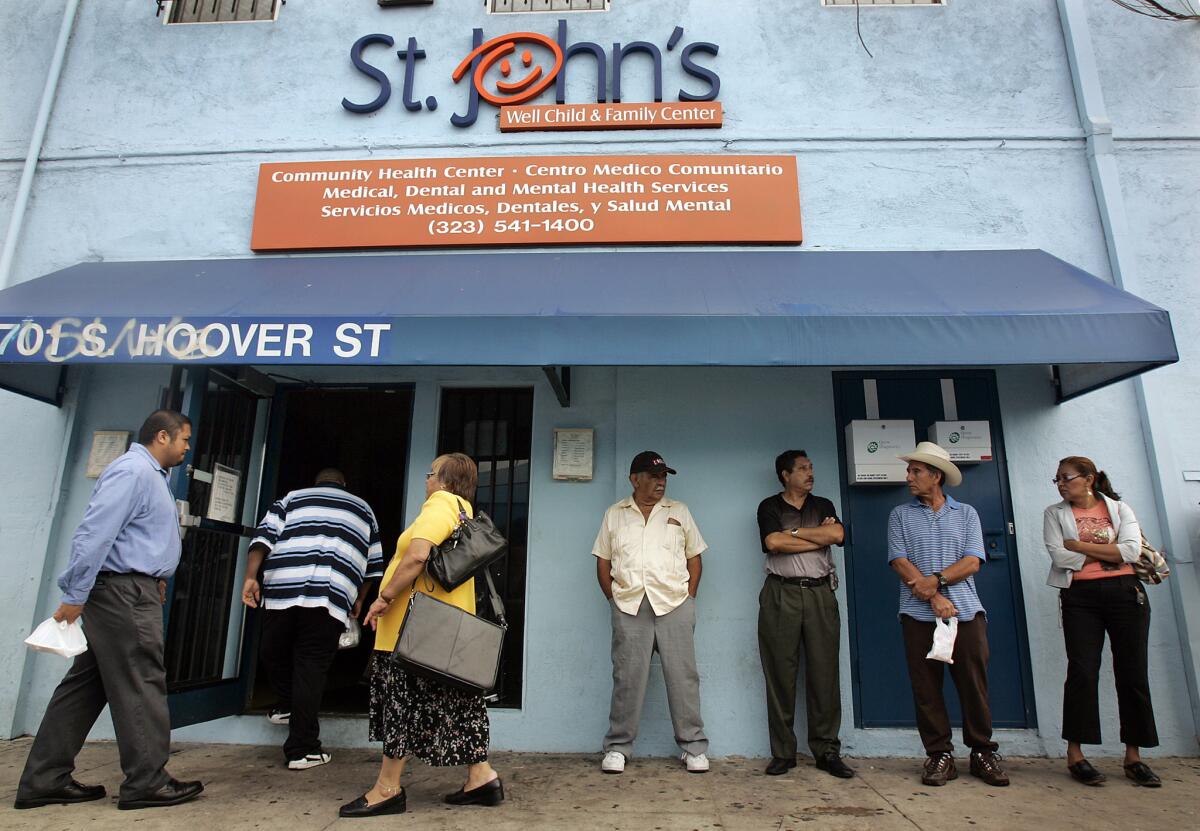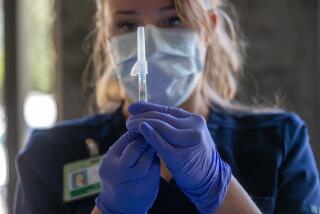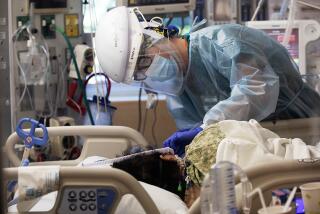At L.A. clinics for the poor, doctors and nurses lack safety supplies as coronavirus spreads

Community clinics and health centers continue to face a shortage of test kits and medical equipment they need to protect staff against the novel coronavirus.
At St. John’s Well Child and Family Center, a nonprofit that operates 18 health centers and school-based clinics in Los Angeles and Compton, the situation has become so dire that patients have offered to sew surgical masks for the staff.
In a news teleconference Tuesday, St. John’s Chief Executive Jim Mangia said it wouldn’t be enough and called on the federal government to mandate the production of protective gear and masks for healthcare workers.
“The president invoked the Defense Production Act, he’s used it to force [General Motors] to create ventilators,” he said. “But he’s not using it for the production of protective gear and masks for front-line healthcare workers.”
His plea came a day after Los Angeles County health officials reported that a healthcare worker had died from COVID-19 and on the same day that an elected official in the San Francisco Bay Area said a hospital leased by the state of California to care for coronavirus patients was facing a shortage of personal protective equipment, including masks, gowns and gloves.
Since the outbreak of COVID-19, community clinics and health centers in Los Angeles County have helped mitigate the spread of the virus and prevented sick patients from overwhelming hospitals.
Community clinics that typically handle primary care including checkups and prescribe patients insulin for diabetes or medicine for their high blood pressure have been canceling their regular appointments and seeing more patients with symptoms that match those of the coronavirus.
Mangia said last week that the nonprofit saw about 879 patients who were required to be placed in triage tents to isolate them from other patients. He said 39 tests were performed and seven returned positive for COVID-19. He said at least three patients have been hospitalized.
Every year, about 420,000 patients visit one of the 18 community health clinics in Los Angeles and Compton that are run by St. John’s Child Well and Family Center. He said about 8,000 of those patients are homeless and 32,000 lack legal status in the United States.
He said with the number of patients growing as the virus continues to spread, the centers are barely getting by. He said the situation will worsen if they don’t get more help.
“By the end of this week, we will have run out of protective gear,” Mangia said. “We still don’t have the tests that we need in order to contain the spread and isolate our patients.
“We’re essentially doing makeshift front-line work,” he added.
In Los Angeles County, more than 350 community clinics and health centers provide primary care and preventive services to 1.7 million patients a year, many of whom live in poverty or are uninsured, said Louise McCarthy, president of Community Clinic Assn. of Los Angeles County, a coalition of private and non-private health facilities.
The clinics and centers are also facing massive financial losses as they have had to scale back nonemergency services and switch to telemedicince, which they say they aren’t able to be reimbursed for yet.
In southeast Los Angeles County, a region dotted with small, working-class cities, more than a dozen elected officials came together in order to amplify their plea to help with the region’s medical and financial needs.
The coalition of council members and mayors signed a letter asking county and state officials to provide the region with three drive-up testing sites, respirators and other medical equipment in Downey, South Gate and Lynwood.
“Our region of the county is extremely dense, with approximately 8,485 people per square mile, an average well above the rest of the county and the state,” the letter read in part. “With these density levels, which in some cities exceed that of New York City, we know that the COVID-19 pandemic will have major impacts to our communities.”
The letter continues: “Our cities rely heavily on clinics. Hospitals have limited access and are already overwhelmed serving our 19 cities that combine for over a million people.”
The officials also requested economic relief for many of the region’s small businesses and to provide compensation to hotels that are used for COVID-19 quarantines.
More to Read
Start your day right
Sign up for Essential California for news, features and recommendations from the L.A. Times and beyond in your inbox six days a week.
You may occasionally receive promotional content from the Los Angeles Times.







